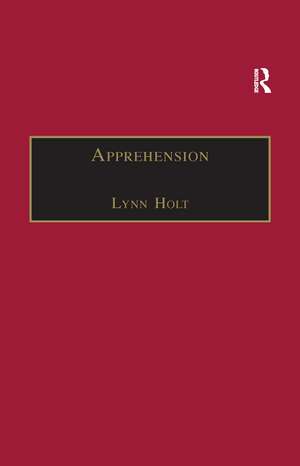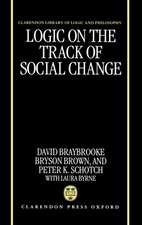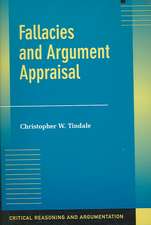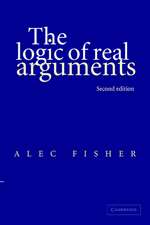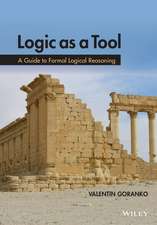Apprehension: Reason in the Absence of Rules
Autor Lynn Holten Limba Engleză Paperback – 11 noi 2016
| Toate formatele și edițiile | Preț | Express |
|---|---|---|
| Paperback (2) | 211.54 lei 6-8 săpt. | |
| Taylor & Francis – 11 noi 2019 | 211.54 lei 6-8 săpt. | |
| Taylor & Francis – 11 noi 2016 | 338.33 lei 6-8 săpt. | |
| Hardback (1) | 761.76 lei 6-8 săpt. | |
| Taylor & Francis – 10 dec 2002 | 761.76 lei 6-8 săpt. |
Preț: 338.33 lei
Preț vechi: 409.38 lei
-17% Nou
Puncte Express: 507
Preț estimativ în valută:
64.76€ • 70.37$ • 54.43£
64.76€ • 70.37$ • 54.43£
Carte tipărită la comandă
Livrare economică 21 aprilie-05 mai
Preluare comenzi: 021 569.72.76
Specificații
ISBN-13: 9781138256538
ISBN-10: 1138256536
Pagini: 128
Dimensiuni: 156 x 234 mm
Greutate: 0.45 kg
Ediția:1
Editura: Taylor & Francis
Colecția Routledge
Locul publicării:Oxford, United Kingdom
ISBN-10: 1138256536
Pagini: 128
Dimensiuni: 156 x 234 mm
Greutate: 0.45 kg
Ediția:1
Editura: Taylor & Francis
Colecția Routledge
Locul publicării:Oxford, United Kingdom
Cuprins
Contents: Introduction; The Aristotelian background: practical reasoning, theoretical reasoning, and the intellectual virtues; Apprehension and the apprehensive virtues; The epistemic role of apprehension; The rationality of scientific discovery and experiment; Objectivity and truth; Index.
Recenzii
'Holt deserves applause for a book which combines a well-articulated line of argument with an engaging and varied expository style. His style is reserved and succinct, without needless recurrence. Because of this the author accomplishes a great deal more than many authors would in a short text of 120 pages. This book will appeal to epistemologists and metaphysicians, and to those with strong interdisciplinary interests, as Holt blends his neo-Aristotelianism with a range of previous research interests in rationality theory, scientific discovery, and social psychology.' Notre Dame Philosophical Reviews
Descriere
This book introduces and explores the role of apprehension in reasoning - setting out the problems, determining the vocabulary, fixing the boundaries, and questioning what is often taken for granted. Lynn Holt argues that a robust conception of rationality must include intellectual virtues which cannot be reduced to a set of rules for reasoners, and argues that the virtue of apprehension, an acquired disposition to see things correctly, is required if rationality is to be defensible. Drawing on an Aristotelian conception of intellectual virtue and examples from the sciences, Holt shows why impersonal standards for rationality are misguided, why foundations for knowledge are the last elements to emerge from inquiry not the first, and why intuition is a poor substitute for virtue. By placing the current scene in historical perspective, Holt displays the current impasse as the inevitable outcome of the replacement of intellectual virtue with method in the early modern philosophical imagination. Written in an engaging and jargon-free style, this book is of interest to a wide range of readers, particularly epistemologists and philosophers of science concerned with the fate of reason.
